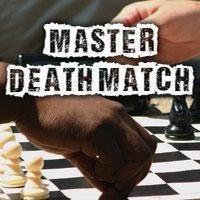
Vachier-Lagrave Nips Andreikin In Death Match 29
The best French player of all time narrowly held off the late charge of a recent FIDE Grand Prix winner in Death Match 29.
GM Maxime Vachier-Lagrave survived a scary attack in the penultimate game and drew the final bullet game to beat GM Dmitry Andreikin 17-16.
This was the highest-rated Death Match ever; both players are in the top 20 in the live ratings list. Vachier-Lagrave weighed in at 2758 (13th) and Andreikin at 2737 (19th).
Andreikin is a past winner of the event -- he dismantled a former world blitz champion earlier this year (going two straight hours without losing a game). On Saturday, a different story emerged early. He lost the first two games and three of the first four.
"I wouldn't be playing if I didn't have confidence," MVL said.
The two know each other well. They've played six games in classical chess, going all the way back to the 1999 World Youth Championship.

Most experts predicted Andreikin would have the upper hand in the final 45 minutes of 1+1, so stretching a lead seemed vital for the higher-rated Vachier-Lagrave.
"Playing against Dmitry has always been much less fun for me that against Maxime," chatted GM Georg Meier. "He's just that fast."
As Chess.com live users know, MVL's no slouch either.
A few quick wins and overall speedy play meant that the duo played the most games in a Death Match since edition 14.

Instead, MVL gave away the early plus, thanks in part to an ill-timed computer update that occurred in game five. After only three moves, he lost on time.
Andreikin won the next game, too, this time overcoming MVL's favorite, the Najdorf. In a fascinating endgame, Black's Tetris-like pawn center looked formidable, but spectator GM Alex Yermolinsky was the first to spot that the rook sac was unsound.
If 51...e2 followed by advancing the d-pawn, White's rook and king get back just in time.
In Andreikin's next turn as White, another Sicilian followed, and he again got the upper hand. The inventive exchange offering "won Dmitry some fans" according to commentator GM David Smerdon.
The players thus moved to the 3-minute segment tied at 4. The Frenchman promptly rattled off a hat trick, the first of two in the match.
Only one match after Andreikin's tactics, game nine showed that MVL can also sac the exchange for pressure.
"This is such a high-standard game," commentator GM Simon Williams said.
That praise could not be used on the following game. MVL beat Andreikin's Trompowsky Attack in a mere 13 moves.
"Blink and you might miss it," Williams said (luckily, we have hyperlinks for such blitzkriegs).

Being 2750+ of course requires versatility in winning methods, and "the man with two names" (as GM Viktor Korchnoi dubbed him) made it a trifecta in game 11 by winning positionally.
"He just demonstrated how to play against the isolated pawn," Williams said, explaining that MVL traded pieces, blockaded the pawn, and applied constant pressure.
"That endgame is supposed to be drawn!" Smerdon said.
Andreikin won three of the next four but still lost the segment, 6.5-4.5 (the first draw of the match didn't come until game 18, quite possibly a Death Match record).
The most visually striking move of that mini-run was 22...Bg3 in game 15. Although it is a standard idea in the King's Indian Defense, the online crowd loved it.
Would Vachier-Lagrave's two-point gap be enough cushion for what would end up being 14 bullet games? Initially, the answer looked to be "no."

Andreikin unsurprisingly was the faster player. He won game 21 with 48 seconds remaining on his clock. "It's like he's taking a shot of Red Bull to his main artery," was Smerdon's analysis.
"He's turbo-charged," Williams added. "It just looks like he's the 'daddy' of one-minute."
Two games later, Andreikin won the weird ending of Q+N vs. R+B+3P, proving once again that's it's always easier to have the queen in fast time controls.
The Russian trotted out 1. b3 consistently, including in the next game, which he won after MVL botched the endgame.
With the score now tied after 24 games, Vachier-Lagrave organized his second three-game winning streak, only to have Andreikin win 3.5 of the next four to deadlock them again.
The match clock didn't have much time remaining, and the commentators thought everything hinged on game 32. MVL allowed the "classic bishop sacrifice" on h7, or did he? Andreikin spent 20 seconds, a relative eternity in bullet, before eschewing the repetition and going all-in with 21. Rd3?
The good news for Andreikin was that he resigned early and thus preserved enough time for another game. The bad news was that MVL was better throughout. The final game ended drawn with king versus king. Andreikin's bullet winning margin was only one game (7.5-6.5).
Smerdon called it the "Death Match of the Century."
This was the first Death Match with two commentators that formerly battled each other since IMs Danny Rensch and David Pruess.
MVL won $500 for the overall win and another $150 for winning 1.5 segments. Andreikin took $200 in the loss and also won $150 for 1.5 segments won.
"It was really tough," Vachier-Lagrave said. "I expected to maybe play a little better in bullet, but you never know when you'll be in really good shape.
"It was more fun than tiring. Of course, at the end, it was tense."


